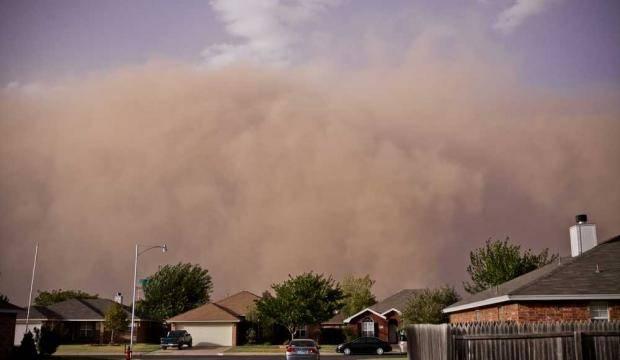Potential Haboob Lung Syndrome Concern
It might be beneficial to cover your face or stay indoors the next time there’s blowing dust outside.
Dr. Ragesh Panikkath, a physician and fellow in cardiology at the Texas Tech University Health Sciences Center, said not doing so could put you at risk for developing something he calls “Haboob Lung Syndrome.”

Panikkath said the haboob that hit Lubbock in 2011 created some lung issues for four otherwise-healthy people he later observed for a study regarding the effects of the dust storm on the lungs. Each one spent some time exposed to the storm.
Dust-associated breathing issues are not new, he said. Breathing issues are often reported around the Middle East where haboobs are more common and several similar cases were reported during the Dust Bowl.
Kenneth Nugent, chief of pulmonary and critical care at the HSC, said the disturbance created in the lungs seems to cause an inflammatory reaction similar to an infection, but it’s not.
“Lungs can be overwhelmed with intense dust exposure,” he said. But that type of reaction to intense exposure is not limited to dust particles.
Any abnormal particle will create a disturbance, he said.
The patient cases cited in Panikkath’s paper published in The American Journal of Medicine in 2013 reported identical symptoms - a cough and shortness of breath.
During medical observation, each patient had low oxygen levels.
A healthy oxygen level is generally between 95 to 100 percent, Panikkath said. Three patients presented with oxygen saturation levels in the 70s. One had saturation levels in the 80s.
Patient X-ray images of the lungs are cloudy.
Each patient was tested and questioned extensively, Panikkath said.
“There were no prior conditions,” he said.
None of the patients were smokers, none had lung issues and none had previous health issues. Throat cultures came back clear and doctors ruled out several probable causes, including asthma and allergies, Panikkath said.
After receiving oxygen, the patients’ oxygen levels improved but some still didn’t reach healthy levels. With the oxygen provided, they should have, he said.
One patient observed in the study died, he said.
“Treatment is not clear,” Panikkath said.
With recent weather patterns, Panikkath said he wants to inform Lubbockites about Haboob Lung Syndrome.
Nugent said it’s vital to protect your lungs.
“If you see dust, you probably should be out of it,” he said.
Related Stories
How Does Your Garden Grow?
As spring approaches, some people’s thoughts turn to gardening. Whether it’s a flower garden they desire or a vegetable garden want to have, they begin planning what they’ll plant and what they need to do to ensure a successful garden.
Adopt a Growth Mindset for a Better Life
A “growth mindset” accepts that our intelligence and talents can develop over time, and a person with that mindset understands that intelligence and talents can improve through effort and learning.
Drug Use, Family History Can Lead to Heart Disease in Younger Adults
Abstaining from drug abuse and an early diagnosis of familial hypercholesterolemia (high cholesterol) can help prevent heart disease.
Recent Stories
The TTUHSC Laura W. Bush Institute for Women’s Health Welcomes Ben Carson as Power of the Purse Keynote Speaker
Retired neurosurgeon and former U.S. Secretary of Housing and Urban Development Ben Carson, M.D., delivered a keynote address at the Power of the Purse luncheon and fundraiser today (April 18).
Filling the Gap: PA Impact on Rural Health Care
Assistant Professor and Director of Clinical Education Elesea Villegas, MPAS, PA-C, spoke about the challenges rural health care currently faces and how PAs are stepping up to better serve the rural patient population.
School of Pharmacy Remembers Contributions of Key Collaborator
Cynthia Nash, Pharm.D., served as an Adjunct Assistant Professor of Pharmacy Practice for the School, and was an instrumental collaborator and key ally in our partnership with the Dallas VA North Texas Health Care System.
